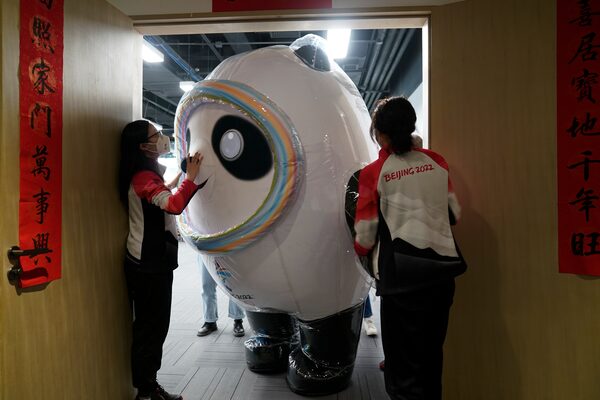
Hundreds of people line up to visit a store selling 2022 Winter Olympics memorabilia in Beijing on Feb. 7, 2022.Andy Wong/The Associated Press
Forget Eileen Gu or Mikaël Kingsbury, a chubby panda astronaut encased in “ice” is emerging as the true star of the Beijing Winter Olympics.
There were long queues outside stores in Beijing selling plush toy versions of Bing Dwen Dwen on Tuesday, while inside the Olympic bubble, the official store sold out before midday, as Chinese volunteers, journalists and staff flocked to snap them up.
“Today sell out,” read a red sign pasted in the official merchandise store Tuesday morning, as opposite, dozens of people queued outside the China Post office, packing Bing Dwen Dwen keychains and statuettes into boxes for shipping to other parts of the country.

Bing Dwen Dwen, the mascot of Beijing 2022, turns sideways to exit through the doors after visiting the Xinhua news agency's office at the Winter Olympics in Beijing on Feb. 8, 2022.Jae C. Hong/The Associated Press
A manufacturing crunch caused by the Lunar New Year holiday, which coincided with the opening of the Beijing Olympics, has led to Bing Dwen Dwen shortages, driving up the price of souvenirs on the secondary market. Some porcelain pandas, which retail for around the equivalent of $55, were going for hundreds of dollars online.
Police in Dongcheng, a district of Beijing, said Tuesday they had arrested three people who had “obtained illegal profits” by selling Bing Dwen Dwen souvenirs at high prices, disrupting the “normal purchasing order,” state media reported.
Beijing Winter Olympics: Canada’s Meryeta O’Dine races to bronze medal in women’s snowboard cross
But such actions may not be enough to dampen the craze, with the hashtag “One Dwen for each family” trending online, attracting tens of millions of views, while some in Beijing queued overnight Tuesday to be first in line at the main outlet in Wangfujing, a popular shopping district.
According to state media, Gongmei Emporium in Wangfujing sold more than three million yuan ($600,000) in Olympics merchandise last Friday alone. Shanxi Securities, a brokerage firm, has estimated total revenue from selling licensed products could top 2.5 billion yuan.

A man holds the Bing Dwen Dwen doll that he purchased from a store selling 2022 Winter Olympics memorabilia in Beijing on Feb. 7, 2022.Andy Wong/The Associated Press
Speaking at a news conference Tuesday, Zhao Weidong, a spokesman for the Beijing Olympics organizing committee, said, “We are paying close attention” to the Bing Dwen Dwen shortages.
“We are co-ordinating to increase supply,” Mr. Zhao said. He later told state media that even he has been pestered by friends asking where they could get their hands on the panda.
While factories will be rushing to flood the market with more Bing Dwen Dwen plushes and keychains, other items may take longer. The porcelain dolls that have proved particularly popular are handmade and laborious to produce. Manufacturer Shunmei Group, based in Fujian, told state media the first batch has completely sold out, and the next lot will not be delivered until around Feb. 25, after the Games.
Shunmei is not the only company enjoying a windfall from the Olympics. Chinese investors have flooded to Games-related (and not-so-related) stocks, with merchandise manufacturer Beijing Yuanlong Yato Culture Dissemination Co. Ltd., for example, seeing a jump of more than 10 per cent in trading this week.
Medalists receive an Olympic wreath adorned with Bing Dwen Dwen during the flower ceremony.LINDSEY WASSON/Reuters
Other spikes seem to be driven by pure enthusiasm: After China’s Ms. Gu won a gold medal in the freestyle skiing big air event on Tuesday, shares in Invengo Information Technology Co. Ltd. shot up. The firm has nothing to do with the Olympics, but its Chinese name – Yuanwanggu – sounds a bit like “look out for Gu.”
While Bing Dwen Dwen is cuter than some Olympic mascots of the past, his real popularity may lie in the COVID-19 restrictions that prevented most Chinese citizens from attending these Olympics.
“I wanted to see the Olympic Winter Games in person, but I couldn’t go because of the COVID-19 epidemic,” Guangzhou resident Huang Wenchao told state news agency Xinhua. “Therefore, I invited the mascot into my home, so that I could share the atmosphere.”
With a report from Reuters
Our Olympic team will be writing a daily newsletter to land in your inbox every morning during the Games. Sign up today to join us in keeping up with medals, events and other news.
 James Griffiths
James Griffiths